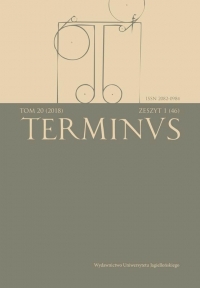Reformacyjna poezja biblijna Laurentiusa Fabriciusa (1539–1577) z okresu pobytu w Królewcu (1561–1571) i jej znaczenie wyznaniowo-polityczne
Reformation Biblical Poetry of Laurentius Fabricius (1539—1577) from the Period of His Stay in Königsberg (1561—1571) and Its Religious and Political Significance
Author(s): Angelika Modlińska-PiekarzSubject(s): Social history, 16th Century
Published by: Wydawnictwo Uniwersytetu Jagiellońskiego
Keywords: Laurentius Fabricius Raudensis; Königsberg; neo-Latin poetry; Reformation;Lutheran doctrine; Protestant Confessionalization
Summary/Abstract: The aim of this paper is to discuss the religious poetry of the Lutheran preacher and poet Laurentius Fabricius of Rudy (1539—1577), published by a Silesian during his stay in Königsberg during the reign of Duke Albert of Prussia. To date, the topic of the work of Laurentius Fabricius of Rudy (not to be confused with the Hebraist Laurentius Fabricius of Gdańsk, who lived in the years 1555—1629) has not been researched at all, neither in Poland nor abroad. Apart from the author of this paper, no-one studied the literary output of this poet. Laurentius Fabricius was briefl y mentioned by Reinhold Curicke (1687), Joannes Albert Fabricius (1709), Andreas Charitius (1715), Ephraim Pretorius (1760), Ludwig F. Rhesa (1834), and Hermann Freytag (1898 and 1903). The author presents the most important themes and motifs present in the poet’s oeuvre, briefly discussing the functions of individual works in promoting and explaining the most important doctrinal principles and issues related to the Lutheran Reformation (sola gratia, sola fide, solus Christus, sola Scriptura and others). She also draws attention to the way in which biblical themes are interpreted, which translates into the spread of certain social attitudes (e.g. giving up celibacy or promoting humility and poverty in order to prevent the escapes and revolts of the subjects of the Prussian duke). She also points out attempts to modify the biblical content in pursuance of building a Protestant worldview and religious order (the leading role of the ruler in the preservation and observance of a doctrine) and discusses selected cases of individualisation of the situational context for the purposes of Duke Albrecht’s current policy (here especially the war with the papacy and support for the marriage of Gotthard Kettler and Anna of Mecklenburg). The paper enriches the knowledge about Lutheran religious poetry printed in Königsberg during the reign of Albert of Prussia and sheds some light on the work of an unknown Neo-Latin poet. Th e author proves that the role of this poet in the capital city of the Prussian state in the 1560s must have been quite signifi cant. Not only did Fabricius study at the University of Königsberg and during his studies published his works dedicated to the university professors and the Duke himself, but he was also clearly connected with the Königsberg court (through the Duke’s collaborators and advisors), which suggests that he also had personal contact with the prince. Not without signifi cance is also the fact that for many years he served as a preacher or pastor in one of the churches near the city (in Löbenicht). The paper presents the propagandistic and opinion-forming role of Fabricius’ poetry in the literary, social, confessional and political life of the then Königsberg, and at the same time paves the way for further comparative research on its infl uence on reformation literature, written both in Latin and vernacular languages, in Prussia and neighbouring countries, especially in the Polish-Lithuanian Commonwealth and in Livonia in the second half of the 16th century.
Journal: TERMINUS
- Issue Year: 20/2018
- Issue No: 1 (46)
- Page Range: 63-83
- Page Count: 21
- Language: Polish

